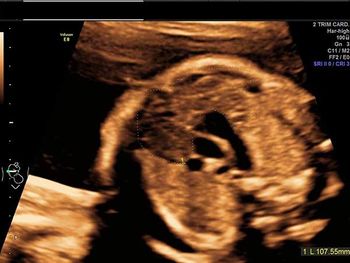
Patients undergoing IVF do better with strong social support, but many of these patients feel isolated and don’t share their fertility struggles. Can mindfulness help?

Patients undergoing IVF do better with strong social support, but many of these patients feel isolated and don’t share their fertility struggles. Can mindfulness help?

Data from a study presented at the American College of Cardiology’s 63rd Annual Scientific Session raise the intriguing question of whether multiparity raises the risk of cardiovascular disease (CVD) in women. The report, by researchers from the University of Texas Southwestern, suggests that plaque in the heart and arterial thickening may be more prevalent in women who give birth four or more times than in those with two to three live births.

Failure to lose any ‘baby weight’ in the first year postpartum could increase a woman’s risk of diabetes and cardiovascular disease, over the long term, according to a recent study in Diabetes Care.

According to a recent study in The Lancet, a reduction in preterm births and childhood hospital visits for asthma are additional benefits to public smoking bans.

Antidepressant use in pregnancy increases the risk of preterm birth. However, untreated depression is serious, and the needs of the mother must come first.

Mammography screening for breast cancer saves lives: this should be the message that physicians spread to colleagues and patients, say leading experts.

Challenge your diagnostic skills: Can you identify the highlighted structure?

A commentary on the recommendations in ACOG Practice Bulletin No. 136.

Contemporary OB/GYN was named a Jesse H. Neal Award winner on March 18, 2014 by American Business Media during its 60th Annual Neal Awards ceremony in New York City.

Was there an unreasonable delay in making the diagnosis, and did that delay have an effect on the patient’s treatment and overall life expectancy?

The best strategy for identifying pelvic masses and triaging patients to the appropriate surgeons.

Know your limitations, document, train, and communicate, says this MFM specialist who has served as an expert witness.

In this first installment of a regular series, a doctor test-drives two surgical tools and finds them friendly and functional.

The American College of Obstetricians and Gynecologists and the American Academy of Pediatrics have issued a joint statement on water births, the first for the increasingly popular practice.

In the first study looking at latent labor experiences among disadvantaged populations of women, researchers at Baylor University’s Louise Herrington School of Nursing and Parkland Health & Hospital System found that 41% of low-income women discharged from the hospital due to a diagnosis of false or early labor did not want to be sent home.

Although stroke is the number-3 cause of death in women, a recent study presented at the American Heart Association’s (AHA) Epidemiology and Prevention/Nutrition, Physical Activity, and Metabolism 2014 Scientific Sessions indicates that many US women are unfamiliar with the warning signs of a stroke.

Justices recently heard oral arguments in Sebelius v. Hobby Lobby Stores Inc. and Conestoga Wood Specialties Corp. v. Sebelius, in which the for-profit employers say they should be allowed to refuse to offer their workers no-cost contraceptive coverage-which is guaranteed by the Affordable Care Act (ACA)-based on the company owners’ religious beliefs.

The Physician Payment Sunshine Act was enacted as part of the Patient Protection and Affordable Care Act. Designed to increase the transparency of financial relationships in the healthcare industry, the Sunshine Act requires the collection and reporting of certain financial transactions to the Centers for Medicare and Medicaid Services (CMS).

The Centers for Medicare and Medicaid Services (CMS) has provided more details for hospitals and Eligible Professionals (EPs) who may qualify for the Meaningful Use Stage 2 (MU2) hardship exception for the 2015 reporting year.

Tdap vaccination is both safe and recommended for all pregnant women during every pregnancy, regardless of the timing of their last Tdap immunization.

The American College of Obstetricians and Gynecologists (ACOG) holds its Annual Clinical Meeting (ACM) in Chicago from April 26 to 30. Contemporary OB/GYN will be there-in person and on Facebook and Twitter-providing coverage of colloquia, clinical seminars, postgraduate courses, and more.

Miscarriage and stillbirth can occur in pregnant women with Haemophilus influenzae infection. Here, new data quantify the risk and reveal which bacteria type poses the most threat.

A first-of-its-kind report from the National Center for Health Statistics (NCHS) suggests that many teens and women in small towns or suburbs or who lack health insurance are receiving routine prenatal care from providers who are not ob/gyns.

According to a new study in the Annals of Epidemiology, high levels of vitamin D do not prevent hypertension in pregnancy. The report adds to the literature on vitamin intake and preeclampsia while contradicting some previous reports that have suggested a link between low maternal levels of the vitamin and the disorder.

According to a recent study in Human Reproduction, women who produce a low number of oocytes during in vitro fertilization (IVF) seem to have an increased risk of miscarriage.

New research reveals opportunities to improve care in women in latent labor and tips to keep them happier when you send them home.

New research expected this year will bring about significant changes to clinical practice. Here, society leaders share what’s on their radar for 2014.

The two widely used surgeries for apical prolapse work equally well for both apical prolapse and stress urinary incontinence two years postsurgery, research shows.

A history of gestational diabetes could be a risk factor for later heart disease, highlighting that reproductive complications may unmask future disease risk.

What research from the past year will have the most significant impact on women's health care? The leaders of five major ob/gyn societies weigh in.